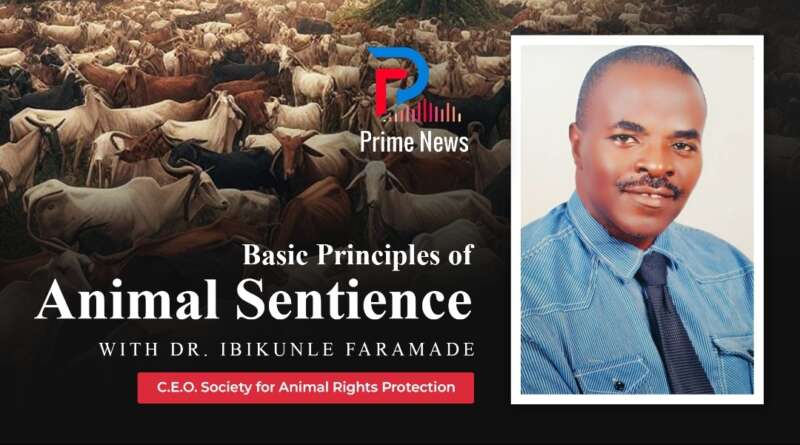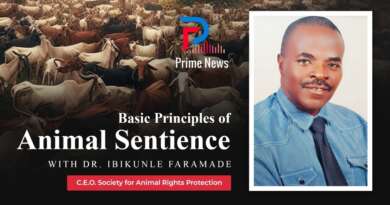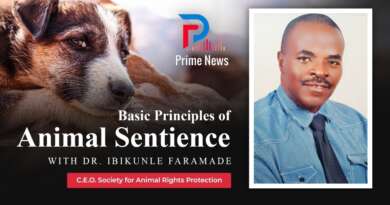Welfare Concerns for Wild Animals 1
By Dr Ibikunle Faramade
Wild animals in the context of animal welfare could be defined as free living or captive birds and other vertebrate animals including aquatic animals. They are free living animals that requires no human intervention for their survival. Their forebears were not also selectively bred for docility, human companionship or handling. They are wild and could be dangerous because of their self-preservation instincts and survival strategy. Despite the dangerous disposition of most of them, they perform unique roles in maintaining the balance of ecosystem without which humans may face existential threat. Above all, they are sentient and the ‘insurance’ of Professor Rogers Brambel’s five freedoms of animals equally cover them.
In many fora, most discussions are centered on welfare issues that are related generally to domestic animals including birds and livestock. Although of recent, many animal ethologist have begun to look in the direction of the welfare of wild animals. The consideration for the welfare of wild animals could be divided into two, viz., the welfare concerns for free living wild animals and the welfare concerns for captive wild animals.This week, we shall devote attention to the welfare concerns of free living wild animals.
There are different types of free living wild animals. These include terrestrial wild animals, arboreal wild animals and aquatic wild animals. Terrestrial, arboreal and aquatic wild animals cut across different sub- classifications that relates to their feeding patterns and other parameters. They vary in body size, from the mouse to the elephants. They also vary according to the nature of their food, a wide range of food web (interconnection of food chain) instituted by nature to balance the ecosystem.
The time to show concern for the welfare of wild animals is now. This is because, if care is not taken, many wild animal species would soon go into forced extinction, making the achievement of the Goals 14 and 15 of the Sustainable Development Goal futile (i.e. conserve and sustainably use the oceans, seas and marine resources for sustainable development and protection, restoration and promotion of sustainable use of terrestrial ecosystems, sustainably manage forests, combat desertification and halt and reverse land degradation and half biodiversity loss).
Factors that could affect the welfare of wild animals may be divided into two; natural factors and anthropogenic factors (human mediated factors). Natural factors include diseases occurring as epizootics in the wild, predation, bushfire and drought. Anthropogenic factors include habitat loss due to human developments through urbanization and building of infrastructures such as road, rail, sea ports construction, sea dredging, building of housing estates, due to expanding human population etc. Others include environmental pollution, including atmospheric pollution, land pollution and water pollution and contamination.
Industrial agriculture in previously forested and savannah areas, also contribute adversely to wild animal welfare as a result of habitat fragmentation or at times, complete eradication of habitat. Human direct and indirect influences on wild animals’ population control through alteration of critical factors such as excessive illumination and noise etc. also impinge negatively on their ability to procreate and other welfare indicators.
There are a few precautions that could mitigate naturally occurring phenomenon that could lead to welfare problems for wild animals. Naturally occurring diseases of wildlife occur periodically and abate naturally. Survivors would naturally be immuned to future occurrence of that particular disease.
In the same vein, bush fire occur occasionally, also, due to human negligence or accidents. Drought may occur due to prolonged period of lack of precipitation (rain). Predation is a naturally occurring event in the wild, because of the existence of different food chain that interlink to form food web, maintaining the delicate balance of the ecosystem. All these are beyond direct human mitigation or remediation.
The only welfare concerns of wild animals that could be adjusted to ensure the continued survival of the wild animal species in relative state of good welfare is the anthropogenic (human mediated) pressure on good welfare of wild animals. While it is true that human existence is impossible without adequate food that meets the standard of balance diet, there is a need for improved land use measures and planning that would delimit some areas as reserved for animal habitation.
There are forest reserves in Nigeria, created for this purpose, among others, unfortunately, human encroachment has become a terrible menace. Without doubt, intensive agriculture aimed at the production of food enmasse has been entrenched (although, campaigns for the encouragement of homestead/ subsistence agriculture is underway) But, how feasible is the acceptance of such campaigns in the face of pervasive hunger? Therefore, it is desirable that effective mechanisms are put in place to strike a balance between agriculture and encroachment of wild animals’ habitat.
In the area of infrastructure, the time has come to build infrastructure with understanding of environmental sustainability. Environmental Impact Assessment (EIA), a very crucial requirement prior to the building of any infrastructure should be taken more seriously than ever. The reports of EIA should not only reflect the possible environmental damage, but should also include the impact of habitat loss on animals in the area.
Thorough examination/ investigation of the animal species in such areas should be carried out as part of EIA. The dwellers of that locality are repositories of information about animals in their neighborhoods. Such people, apart from the need to deploy technology, should be carried along. Cognizance should also be taken of any rare animal species in that environment, so that its/their preservation could be prioritized in the spirit of animal welfare and sustainable development.
To be continued…
Dr. Ibikunle Faramade is a veterinary pathologist, sustainable development practitioner, animal welfare advocate and a lecturer at the Federal College of Animal Health & Production Technology, Apata. Ibadan. He’s the C.E.O of the Society for Animal Rights Protection, a non-profit and a non-governmental organization dedicated to the promotion of animal welfare, animal rights and prevention of cruelty to animals. animalrightsprotection2020@gmail.com , +2348028305284



